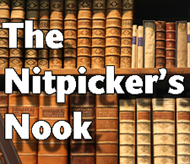The Nitpicker’s Nook is a monthly collection of language-related articles, interviews, and blog posts from around the web. If you read something that would make a good addition, email your suggestion to [email protected].
By Savanna Scott Leslie

- We all learned some “rules” from English teachers that were questionable at best. And as editors, we have the power to challenge those restrictions! Take starting a sentence with and as an example. Edwin Battistella discusses this superstitious proscription. (Oxford University Press)
- Another classic silly English “rule” is the sanction against ending a sentence with a preposition. Jonathon Owen unpacks an example from the now-infamous Deadpool marketing campaign. I suspect the pompous-sounding example was tongue-in-cheek, but Owen’s thorough analysis is well worth a read either way. (Arrant Pedantry)
- Last month, Scots and friends observed Robbie Burns Day in celebration of the Scottish poet with haggis and whisky all ’round. BoldFace’s own James Harbeck marked the occasion with a look at the Scots language. Harbeck examines not Robbie’s Ayrshire dialect but the Doric dialect from Aberdeen, which happens to be the tongue of my ancestors. (Sesquiotica)
- Most editors have a concrete sense of what proofreading entails, and Editors Canada has its own helpful description in its Professional Editorial Standards. Outside the profession, though, you can run into all kinds of definitions. Louise Harnby compares industry guidelines with client expectations and shares some advice on what you can expect as a proofreader. (An American Editor)
- Is guys just for men, or has it become a genderless word? Stan Carey explains how historically masculine words can eventually become generic and why we don’t tend to see this development in feminine terms. (Slate)
- Editors and linguists know dictionaries are descriptive rather than prescriptive. They aim to show how people speak a language—not how people ought to speak a language. But what if a dictionary upholds discriminatory or bigoted views? Canadian anthropologist Michael Oman-Reagan criticizes Oxford Dictionaries for its sexist usage examples in some definitions. (The Guardian)*
*Thanks to Sara for submitting this link to the blog!
Savanna Scott Leslie is an editor and publishing consultant. She recently relocated from Toronto to Hamilton and is enamoured of all things #HamOnt. She tweets @Savanna_SL.
This article was copy edited by Samantha Carr.
